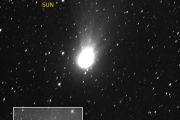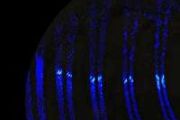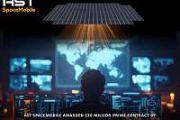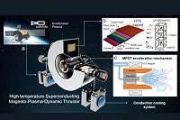
Copernical Team
Hubble uncovers the secret of stars that defy ageing

Some stars appear to defy time itself. Nestled within ancient star clusters, they shine bluer and brighter than their neighbours, looking far younger than their true age. Known as blue straggler stars, these stellar oddities have puzzled astronomers for more than 70 years. Now, new results using the NASA/ESA Hubble Space Telescope are finally revealing how these 'forever young' stars come to be and why they thrive in quieter cosmic neighbourhoods.
Century-old solar records refine future cycle forecasts
 An international team of astronomers has developed a new way to extract solar polar magnetic information from more than a century of historical observations, improving prospects for predicting future solar cycle activity. The work combines data from the Kodaikanal Solar Observatory in India with modern measurements to reconstruct the behavior of the Sun's polar magnetic field over more than 100
An international team of astronomers has developed a new way to extract solar polar magnetic information from more than a century of historical observations, improving prospects for predicting future solar cycle activity. The work combines data from the Kodaikanal Solar Observatory in India with modern measurements to reconstruct the behavior of the Sun's polar magnetic field over more than 100 ALMA survey maps turbulent youth of distant planetary systems
 Astronomers have assembled the most detailed view so far of planetary systems in a long elusive stage between their birth and maturity, using the Atacama Large Millimeter/submillimeter Array (ALMA) in Chile. The ALMA survey to Resolve exoKuiper belt Substructures (ARKS) has produced the sharpest images yet of 24 debris discs, the dusty belts that remain once the main phase of planet formation is
Astronomers have assembled the most detailed view so far of planetary systems in a long elusive stage between their birth and maturity, using the Atacama Large Millimeter/submillimeter Array (ALMA) in Chile. The ALMA survey to Resolve exoKuiper belt Substructures (ARKS) has produced the sharpest images yet of 24 debris discs, the dusty belts that remain once the main phase of planet formation is Primordial magnetism offers fresh angle on the Hubble constant puzzle
 A Simon Fraser University cosmologist reports that new theoretical work on primordial magnetic fields could move researchers closer to resolving the longstanding Hubble tension, the mismatch in measurements of how fast the universe is expanding today.
The Hubble tension arises because two precise approaches to determining the Hubble constant give significantly different results, despite dr
A Simon Fraser University cosmologist reports that new theoretical work on primordial magnetic fields could move researchers closer to resolving the longstanding Hubble tension, the mismatch in measurements of how fast the universe is expanding today.
The Hubble tension arises because two precise approaches to determining the Hubble constant give significantly different results, despite dr Mercury and Earth chorus waves show shared plasma behavior across magnetospheres
 An international team has shown that natural electromagnetic chorus waves, long known in Earths magnetosphere, also occur in Mercurys much weaker magnetosphere with strikingly similar frequency behavior. The work uses coordinated observations from the BepiColombo Mercury Magnetospheric Orbiter Mio during six Mercury flybys between 2021 and 2025, together with decades of data from Earths GEOTAIL
An international team has shown that natural electromagnetic chorus waves, long known in Earths magnetosphere, also occur in Mercurys much weaker magnetosphere with strikingly similar frequency behavior. The work uses coordinated observations from the BepiColombo Mercury Magnetospheric Orbiter Mio during six Mercury flybys between 2021 and 2025, together with decades of data from Earths GEOTAIL Cosmic dust chemistry forges peptide building blocks in deep space
 New experiments show that key molecular building blocks for life can form spontaneously on icy dust grains in deep space long before planets emerge from collapsing gas clouds.
In a laboratory at Aarhus University and at the HUN-REN Atomki facility in Hungary, researchers Sergio Ioppolo and Alfred Thomas Hopkinson reproduced the extreme conditions in giant interstellar dust clouds, where te
New experiments show that key molecular building blocks for life can form spontaneously on icy dust grains in deep space long before planets emerge from collapsing gas clouds.
In a laboratory at Aarhus University and at the HUN-REN Atomki facility in Hungary, researchers Sergio Ioppolo and Alfred Thomas Hopkinson reproduced the extreme conditions in giant interstellar dust clouds, where te Quantum collapse models point to subtle limits in timekeeping accuracy
 Quantum mechanics describes a microscopic world in which particles exist in a superposition of states, being in multiple places and configurations at once, encoded in a mathematical object called a wavefunction. But this picture clashes with everyday experience, where objects appear in definite locations and configurations, never in superpositions.
To account for this, standard quantum the
Quantum mechanics describes a microscopic world in which particles exist in a superposition of states, being in multiple places and configurations at once, encoded in a mathematical object called a wavefunction. But this picture clashes with everyday experience, where objects appear in definite locations and configurations, never in superpositions.
To account for this, standard quantum the Study links Europa's quiet seafloor to hidden potential for life
 The giant planet Jupiter has nearly 100 known moons, but none has captured scientific attention quite like Europa, which likely hides a global salty ocean beneath an icy crust that may contain twice as much water as all of Earth's oceans combined. A new modeling study led by Washington University in collaboration with Woods Hole Oceanographic Institution (WHOI) suggests that, despite this ocean,
The giant planet Jupiter has nearly 100 known moons, but none has captured scientific attention quite like Europa, which likely hides a global salty ocean beneath an icy crust that may contain twice as much water as all of Earth's oceans combined. A new modeling study led by Washington University in collaboration with Woods Hole Oceanographic Institution (WHOI) suggests that, despite this ocean, Europa ice delamination may deliver nutrients to hidden ocean
 A new geophysics study proposes a mechanism that could move life-sustaining nutrients from the battered surface of Europa down into its buried global ocean, improving the odds that the Jovian moon could support microbial life.
Europa, one of Jupiters largest moons, holds more liquid water beneath its frozen shell than all of Earths oceans combined, but the ocean is sealed away under thick
A new geophysics study proposes a mechanism that could move life-sustaining nutrients from the battered surface of Europa down into its buried global ocean, improving the odds that the Jovian moon could support microbial life.
Europa, one of Jupiters largest moons, holds more liquid water beneath its frozen shell than all of Earths oceans combined, but the ocean is sealed away under thick Birth conditions fixed water contrast on Jupiters moons
 While Io, the most volcanically active moon in the solar system, appears completely dry and devoid of water ice, its neighbor Europa is thought to harbor a vast global ocean of liquid water beneath an icy crust. A new international study co-led by Aix-Marseille University and Southwest Research Institute finds that this stark contrast in water content was imprinted at birth as the moons formed a
While Io, the most volcanically active moon in the solar system, appears completely dry and devoid of water ice, its neighbor Europa is thought to harbor a vast global ocean of liquid water beneath an icy crust. A new international study co-led by Aix-Marseille University and Southwest Research Institute finds that this stark contrast in water content was imprinted at birth as the moons formed a 






























